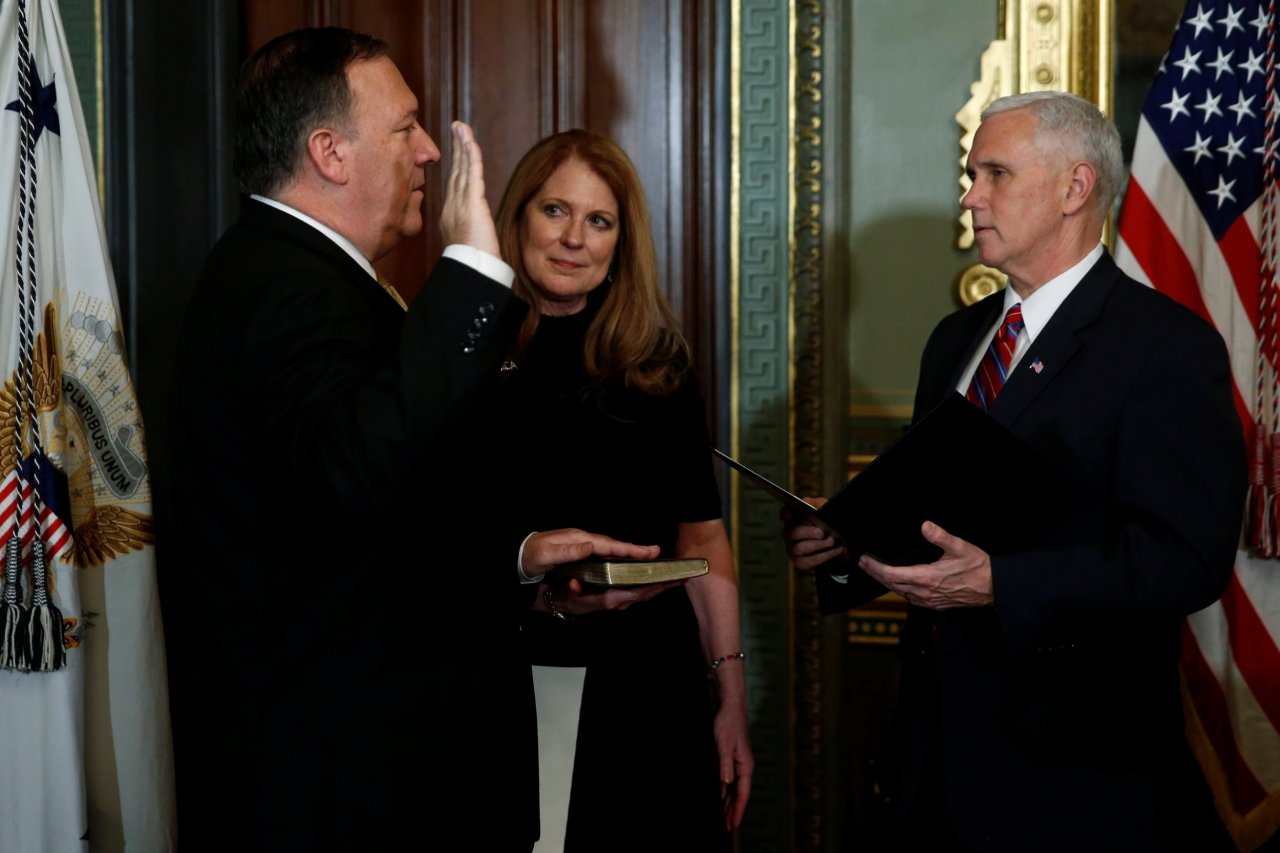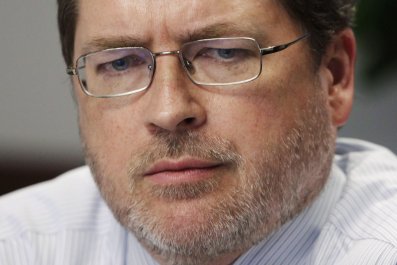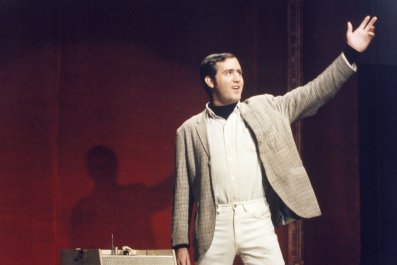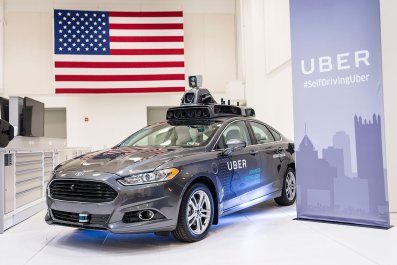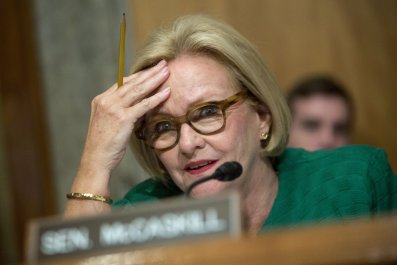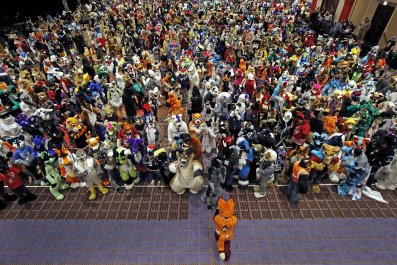Updated | In early November, Cynthia Storer sat down and started sketching out her next lecture for an online course she's teaching for Johns Hopkins University. The topic: the politicization of intelligence. The ex-CIA senior counterterrorism analyst, one of the famous "sisters" who tracked Osama bin Laden, has firsthand memories of the constant pressure from Vice President Dick Cheney and other Bush administration officials to come up with proof that Saddam Hussein had ties to Al-Qaeda. With White House encouragement, the agency also came up with evidence that Hussein possessed weapons of mass destruction. In that sad episode, George Tenet, then CIA director, told Bush he could make a "slam dunk" case for attacking Iraq. As it turned out, Bush's sales pitch was successful, but the intelligence was a bust: No nuclear, chemical or biological weapons were found.
Perhaps it was only a coincidence, but the timing of Storer's lecture was ideal, given the lengthening string of evidence that CIA Director Mike Pompeo has been bending the agency to his boss's will on Russia and Iran.
On November 7, the Intercept reported that Pompeo, a former Tea Party Republican from Kansas, had met in October with William Binney, an ex–National Security Agency official. The latter had been promoting a highly disputed theory that the 2016 hack of the Democratic National Committee (DNC) was not the work of Russian agents but an inside job. Pompeo, according to Binney, told him that Trump had inspired the invitation, saying, "If he want[ed] to know the facts" on the DNC hack, "he should talk to me." Pompeo, the Intercept reported, also offered to set Binney up with other briefings at the FBI and DHS.
To many agency veterans, the Binney meeting was yet another sign that Pompeo isn't willing to deviate from Trump's political agenda. "I suppose the most optimistic view would be that Pompeo is playing to Trump to keep his access, but that he's being more professional, for lack of a better word, when he's actually in the job," John Sipher, a former top CIA Russia hand, tells Newsweek.
A CIA spokesman denies that his boss is parroting President Donald Trump's lines. "One of CIA's core missions is to speak truth to whomever we serve." Pompeo has insisted he "pushes back" with the president. "Absolutely. The whole team does," he told conservative MSNBC pundit Hugh Hewitt back in June. But he added, "It's great when the president or vice president or secretary of defense scribbles a note to me and says, 'Hey Mike, I want you to go relook at this. I want your team to do another scrub.'"
But Pompeo seemed to be following the Republican playbook again this month when he approved the CIA's release of a second batch of files captured during the 2011 U.S. raid on bin Laden's compound in Pakistan. Normally, such a release would be of little interest except for historians and experts on the Middle East or terrorism. But in this case, the declassification looked like a bank shot in Team Trump's effort to undermine the Obama administration's nuclear deal with Iran. Ned Price, a former CIA counterterrorism analyst and national security adviser in the Obama White House, said that the release "wasn't about transparency," as Pompeo claimed. "A close read of his statements and the CIA's public rollout of the new documents," Price wrote for The Atlantic, "suggests, instead, that their release is part of his ongoing campaign to link Al-Qaeda to Tehran," thus creating another reason to renounce the Iran nuclear deal.
Trump campaigned against that deal and continued blasting it after he took office as "one of the worst and most one-sided transactions the United States has ever entered into." When CIA analysts told Pompeo last spring that Iran was complying with the arrangement, he reportedly answered, "Good. But we know they're cheating anyway, we're not just seeing it."
The president eventually decided not to officially disavow the Iran deal; he left it to Congress to decide whether to blow it up and reimpose sanctions. But his prior statements have shaken agency veterans. They fear Pompeo—who took a lead role in repeated Republican congressional investigations of Hillary Clinton and Benghazi—has forsaken his duty to be an honest broker of intelligence. "I've had analysts tell me that he will ask the question, the same question, over and over again, about Iran's compliance with the Iran deal, hoping for a different answer, which has echoes of Cheney and Iraq WMD [weapons of mass destruction]," says a former senior national security official, asking for anonymity in exchange for discussing internal deliberations.
Another worrying sign: Last summer Pompeo ordered the CIA unit tracking Russian subversion, the Counterintelligence Mission Center, to report directly to him. That was followed by his erroneous statement in October that the intelligence community had concluded that Russian meddling "did not affect the outcome of the election"—an assessment the agencies never made. (Former National Intelligence Director James Clapper has since concluded that Russian hacking and meddling on social media probably helped get Trump elected.) But conservative media trumpeted Pompeo's statement, which fit neatly with Trump's dismissal of all the evidence that the Russians helped him. CIA spokesman Dean Boyd later walked back his boss's statement, saying, "The intelligence assessment with regard to Russian election-meddling has not changed, and the director did not intend to suggest that it had."
It took only only weeks, however, for Trump to reopen the wound. After speaking with Putin at the Asia Pacific summit in Vietnam, he suggested that he believed the Russian leader's repeated denials of U.S. election interference. Only after widespread outrage did Trump add later add that he was "with our agencies" on the Russia probe, "especially as currently constituted with their leadership."
CIA intelligence analysts are demoralized by the whipsawing on Russia and Iran, say Price and other agency veterans. "Half of them are ready to drown themselves in the toilet," Susan Hasler, another senior former CIA terrorism analyst, tells Newsweek.
To some, Pompeo's record smacks of dolorous chapters in the CIA's history, when it went along with hardliners on decisions involving Cuba, Vietnam, the Soviet Union and Iraq. Many longtime and former employees are still shaken over the latter. "From what I've heard, management is putting on a happy face and trying to calm the waters, but there's no degree of glossing over this that will fully calm the troubled waters inside," says Price.
The Trump administration's aggressive posture on Iran is particularly troubling. Agency veterans have seen how twisted intelligence and overeager operators can drag the CIA into disastrous projects, like the so-called enhanced interrogation techniques that a Senate Intelligence Committee investigation found were both far more brutal and ineffective than agency officials had admitted. Or the agency's decision to snatch a suspected Al-Qaeda agent off a Milan street in 2003, which led to an Italian court convicting 22 CIA employees and an Air Force officer of kidnapping in absentia. One of those convicted, Sabrina De Sousa, was detained in Portugal in 2015 and sentenced to three years of community service near Rome in November.
Some former officials fear Langley may be pursuing similar operations under Pompeo. In June, he put Mike D'Andrea, a former head of the CIA's Counterterrorism Center, in charge of Iran operations. "He is someone who is willing to push limits, to go as far as can be gone, and in some cases, he would try to go even further, only to have lawyers and others pull him back," says the former national security official. But aggression based on faulty intelligence analysis can lead to disaster.
Storer says aspiring intelligence analysts need to learn how to recognize and resist attempts by politicos to "cherry-pick" evidence to fit preordained, ideological-driven outcomes. They have a professional duty, she tells her students, to resist and tell their higher-ups: "If you don't, and another Iraq happens (or worse), you will regret it for the rest of your days."
But what if the highest of the high-ups are on the president's team? Former agency managers have said that during the internal debates over Iraqi WMD, Tenet and his deputy John McLaughlin ignored warnings by agency managers about the credibility of a key source the White House was relying on to make the case for an invasion. Code named Curveball, the source claimed that Iraq possessed mobile biological weapons labs, an assertion that would turn out to be false. McLaughlin later claimed "no one stepped forward" to warn him about the source, but Margaret Henoch, the former CIA operations manager, tells Newsweek that McLaughlin's executive assistant kept "pushing, pushing and pushing" her to revise her doubts about Curveball
Former CIA Deputy Director Michael Morell, Tenet's executive assistant, disputes the widely shared notion that the Bush officials pushed the CIA into its faulty judgments on Iraqi WMD. "The analysts truly believed it," he told Newsweek in an email. As for White House pressure to link Al-Qaeda to the 9/11 attacks, Morrell said Tenet "fully supported us sticking to our guns on that."
Rebuffing a president, no matter how bizarre his ideas, can threaten a CIA chief's access. And as Trump's firing of FBI Director James Comey demonstrated, it can also threaten his tenure.
But Pompeo's partisanship has ramifications beyond his personal relationship with the president, the former national security official said: Friendly spy services may hesitate to share sensitive intelligence on the Kremlin with "a guy like Mike Pompeo," a Trump confidante "who seems to be driven by ideology rather than anything else."
CIA veterans like Price say their former colleagues must have cringed when they learned about Pompeo's meeting with Binney. It made the agency look like "a bunch of Keystone Cops who are entertaining conspiracy theories," Price said. "The hope is" that Pompeo will "be gone, sooner rather than later," he added, "but the agency is going to have to live with this for a long time, and its reputation both domestically and among its global peers is going to take a huge hit."
Correction: An earlier version of this story said that CIA analyst Susan Hasler was pressured by Paul Wolfowitz to make a case tying Iraq to Al-Qaeda after the 9/11 attacks. It was her husband, Stephen White, also an agency terrorism analyst, whom Wolfowitz questioned "a half-dozen times."



